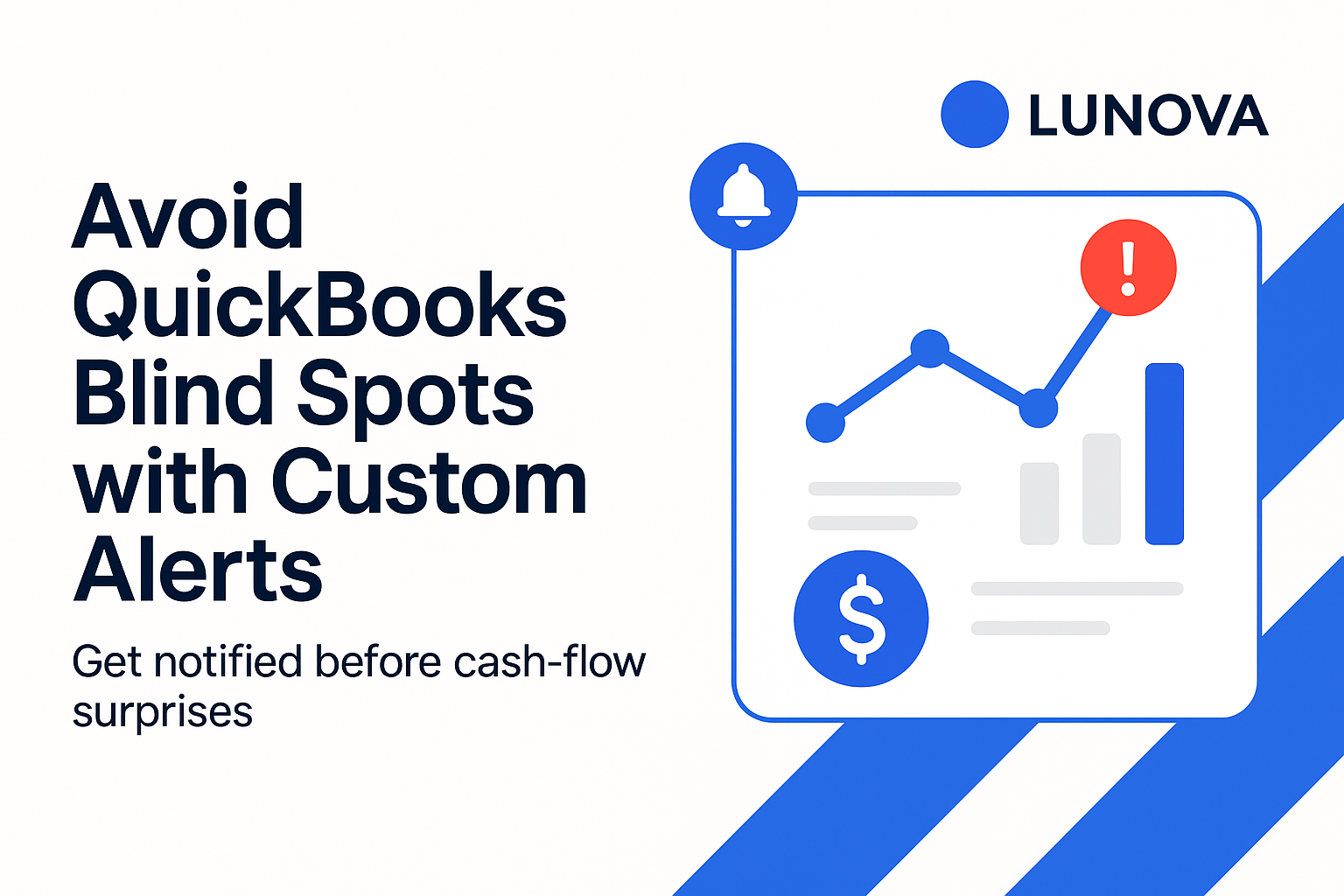You didn’t know a client paid until a week later. Or that a vendor bill was due yesterday. Or that your cash dipped below the amount needed to run payroll. Sound familiar?
You’re not alone. 54 % of small businesses that struggled financially blamed uneven cash flow—and most didn’t spot the problem until it was too late. Static reports tell you what happened, not when it happened.
QuickBooks Online (QBO) records every transaction, but it doesn’t tap you on the shoulder when something important changes. No alert for a missed payment. No ping when your balance drops. Just silence until you log in and see the fallout.
Bottom line: Visibility delayed is cash‑flow denied.
Spot the issue in real time and you still have options.
What QBO Doesn’t Alert You About (But Should)
| ❌ Missing Alert | Why It Matters |
|---|---|
| Late invoices | Cash dries up while follow‑ups get harder. |
| Unexpected withdrawals | One surprise debit can derail payroll or trigger overdraft fees. |
| Large charges / fraud | Big, unapproved spends shorten runway and may go unnoticed for days. |
| Vendor bills due today | Miss a due date → late fees + damaged vendor trust. |
| Client deposits | Delayed thank‑yous look unprofessional and slow next‑step work. |
Pro tip: If timing can hurt cash or relationships, automate an alert.
Why Blind Spots Hurt Small Businesses
💸 Missed Opportunities
No cash‑in notification? You’ll delay hiring, inventory, or marketing moves.
🧾 Trust at Risk
Vendors and clients expect you to be on top of payments. Silence signals chaos.
🧠 Slow Decisions = Stress
Every day without up‑to‑date numbers adds doubt to payroll, spending, and strategy calls.
Close the Gap with Real‑Time Alerts
✅ How Lunova Fills the Void
Lunova connects via secure OAuth and monitors QBO 24/7:
- Overdue invoices
- Low / negative balances
- New deposits
- Large or unusual expenses
- Vendor bills approaching due date
When a rule fires, Lunova sends an email or SMS—no extra dashboards, no spreadsheets.
📬 High‑Impact Alert Recipes
| Trigger | Threshold to Start With | Alert Example |
|---|---|---|
| Invoice overdue | > 30 days | “Invoice #123 is 45 days past due — please follow up.” |
| Checking balance low | < $2,000 | “Main Checking at $1,950. Review upcoming bills today.” |
| Large expense posted | > $5,000 | “$7,500 posted to Office Expenses. Confirm approval needed.” |
| Vendor bill due | Due in 1 day | “Vendor B bill ($1,200) due tomorrow. Schedule payment.” |
| Deposit received | Any | “$4,200 payment received from Client X.” |
Start with the two alerts that would hurt the most if you missed them (usually low balance + overdue invoices).
🛠️ 5‑Minute Setup Guide
- Sign in to Lunova – create an account here.
- Connect QuickBooks – read‑only API; QBO data stays intact.
- Choose a trigger – e.g., Invoice becomes overdue.
- Define conditions – Days > 30 and Amount > $500.
- Select delivery – email and/or SMS.
- Save & test – Lunova sends a test notification so you’re confident it works.
Alert Hygiene: Keep Signals Strong, Noise Low
| Do | Don’t |
|---|---|
| Begin with 3‑5 critical alerts; expand once you see value. | Turn on every trigger—alert fatigue kills action. |
| Review thresholds quarterly—growth changes “low cash.” | Set once and forget; thresholds stale fast. |
Use clear subject lines ([ALERT] Balance Low – $1,950). |
Bury details in long, vague emails. |
| Tie every alert to a next‑step SOP (e.g., “Call client <24 h”). | Treat alerts as FYI with zero accountability. |
FAQ (Fast Answers)
Doesn’t QuickBooks already remind me?
Only via scheduled email reports or client invoice reminders. QBO doesn’t trigger owner alerts in real time.
Is coding or Zapier required?
No. Lunova uses point‑and‑click rule builders.
Will Lunova change my QuickBooks data?
Never. It’s 100 % read‑only.
Can I disable an alert later?
Absolutely—toggle any rule off or delete it with one click.
From Reactive to Proactive—in One Afternoon
QBO records history; Lunova surfaces the present:
- Instant low‑cash warnings
- Same‑day overdue‑invoice pings
- New‑deposit celebrations
Spend less time checking dashboards—and more time running your business.
👉 Try Lunova free today and stop surprises before they cost you.
